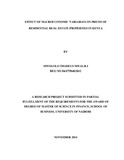| dc.description.abstract | Housing wealth is an important determinant of consumption and saving behavior of
households and is often correlated with savings and better overall financial management.
A family’s investment decision in housing may have profound implications for all those
within it and for the economy at large. The main aim of this study was to investigate
empirically the effect of macroeconomic variables on the prices of residential real estate
property in Kenya. The specific objectives of the study included: to determine the effects
of lending rates on prices of residential real estate property in Kenya; to establish how
rate of unemployment affects prices of residential real estate property in Kenya; to assess
the effect of GDP growth rate on the prices of residential real estate property in Kenya,
and; to determine effect of real inflation rate on the prices of residential real estate
property in Kenya. The researcher employed descriptive research design. The current
study employed descriptive statistics, Pearson’s correlation analysis and ordinary least
squares regression model. Data presentation after the regression and correlation analysis
was through tables. Study results reveal that commercial banks’ lending rates had a
significant negative effect on housing price index. Unemployment was a significant
predictor of residential housing prices. Unemployment rate had a significant positive
effect on residential housing price index. Further findings from the study revealed that
real GDP had a significant positive effect on residential housing prices in Kenya. Lastly,
findings on the effect of inflation on prices of residential houses indicated that inflation
has a significant positive influence on residential housing prices. The following
recommendations are made after considering the study findings. First, the housing sector
therefore needs some fiscal and policy measures to ensure that price movements reflect
the economic situation of the country. Secondly, increase in interest rates should be
managed though effective monetary and fiscal policies by the CBK. Lastly, in sustaining
economic growth, policies should be put in place to control unemployment and inflation
to a sustainable level. | en_US |

